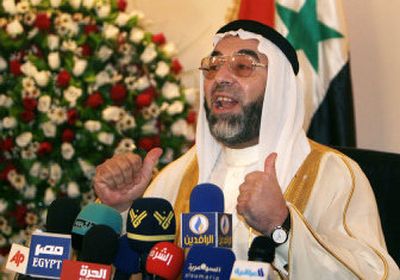Sunni group backs Iraq plan

BAGHDAD, Iraq – Iraqi Prime Minister Nouri al-Maliki’s government is stepping up efforts to gain crucial backing for its national reconciliation plan from the country’s Sunni community, securing support from a major Sunni group Tuesday while meeting secretly with exiled Sunni sheiks from Iraq’s volatile Anbar province in recent days.
The Sunni Endowment, an umbrella agency for Iraq’s Sunni mosques and shrines, “sees a glimpse of hope out of this plan,” said the group’s leader, Ahmed Abdul Ghafour al-Samaraie.
Though al-Samaraie warned that al-Maliki’s plan is doomed unless militias sowing sectarian violence across the country are forced to disband, the leading Sunni cleric said his group “supports this initiative and gives its blessing to it.”
Al-Samaraie’s endorsement represents a small victory for al-Maliki, who has been pushing to garner Sunni backing for his controversial plan to quell Iraq’s Sunni-led insurgency. Last week in Amman, Jordan, al-Maliki’s deputy, Salam Zikam Ali al-Zubaie, conducted secret reconciliation talks with Sunni sheiks from Anbar province, an insurgent stronghold since the start of the war, the Associated Press reported.
In another move aimed at building support for reconciliation, the government released 453 detainees from prisons across Iraq on Tuesday. In all, al-Maliki plans to release 2,500 detainees by the end of June.
“Most of these people wanted to go back home and live a normal life,” Iraqi national security adviser Mouwafak al-Rubaie told CNN outside Abu Ghraib prison west of Baghdad, where some of the detainees were released. “Of course, there’s a possibility that one in 1,000, or one in 10,000, might go home and do something wrong. But this is a risk we have to take.”
On Sunday, al-Maliki laid out a sweeping, 28-point blueprint for peace in Iraq that included granting amnesty to insurgents “not proved to be involved in crimes, terrorist activities and war crimes against humanity.” The plan also calls for allowing former members of Saddam Hussein’s Baath Party who have not committed crimes to return to the political arena.
On Tuesday, the Iraqi government said recently released detainees would be allowed to return to their former jobs. Those who were students when arrested would be permitted to return to their universities without being penalized for time spent behind bars.
Part of al-Maliki’s strategy is to drive a wedge into the insurgency by enticing Sunni nationalist insurgents back into society, leaving foreign fighters and members of al-Qaida in Iraq isolated.
Since the plan’s unveiling over the weekend, violence across Iraq has continued unabated. On Tuesday, a suicide car bombing at a gas station in the northern city of Kirkuk killed three people and injured 17, Iraqi police said. In Baghdad’s Dora neighborhood, a car bomb at a market killed three people and wounded 10 others.
The U.S. military reported that an American soldier was killed by a bomb Tuesday while on foot patrol south of Baghdad, and a Marine died in fighting in Anbar province. Two other soldiers were killed Monday in Anbar, the military said.
Critics of al-Maliki’s strategy say the plan remains shrouded in confusion over who would qualify for amnesty. It has drawn the ire of several U.S. lawmakers over the prospect of pardons for insurgents who have killed American troops. Mahmoud Othman, a leading Kurdish lawmaker, said the plan appears to rule out amnesty for insurgents who have committed crimes, without specifying what types of crimes are meant.